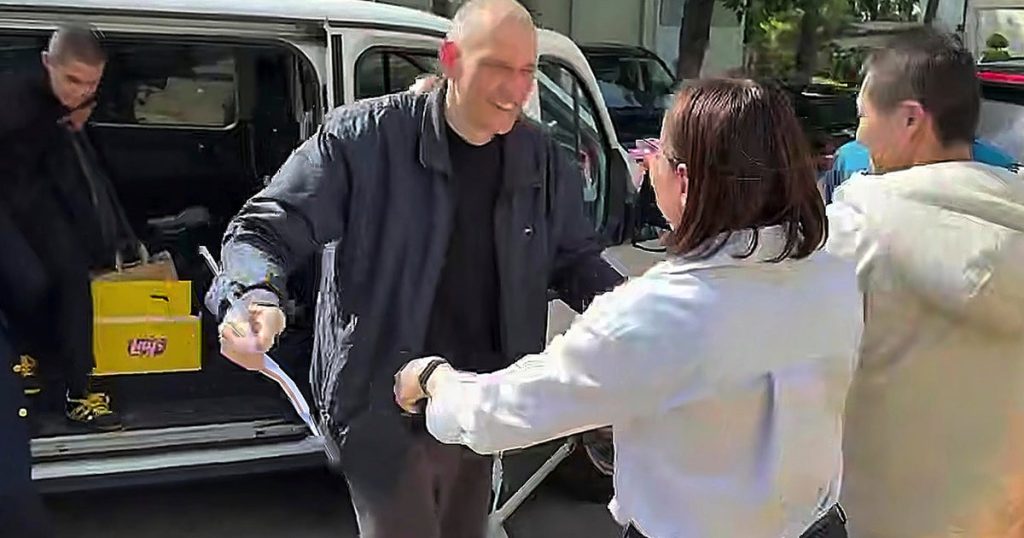In a significant diplomatic development, Belarus has released prominent opposition leader Sergei Tikhanovsky along with 13 other political prisoners. This decision follows a direct appeal from officials in the United States, indicating an possible thaw in relations between the U.S. and Belarus, with implications for the Belarusian political landscape. The move comes soon after a high-ranking U.S. diplomat’s visit to Minsk, marking a notable moment in a region long marred by authoritarian rule and political repression.
| Article Subheadings |
|---|
| 1) Background of Tikhanovsky’s Imprisonment |
| 2) Reactions to the Prisoner Release |
| 3) The Role of U.S. Diplomacy |
| 4) Current State of Political Prisoners in Belarus |
| 5) Implications for Belarus-Russia Relations |
Background of Tikhanovsky’s Imprisonment
Sergei Tikhanovsky was a rising figure in Belarusian politics before his detention in 2020. The popular YouTuber, known for his criticisms of President Alexander Lukashenko, planned to contest the presidential election that year. However, he was arrested just weeks before the vote, which many criticized as a tactic to stifle opposition. Following his arrest, Tikhanovsky was sentenced to an extensive prison term totaling up to 36 years on various charges, ranging from “organizing riots” to “inciting hatred.”
His imprisonment sparked widespread protests throughout Belarus, where many citizens were demanding democracy and an end to the long-standing dictatorship. Sviatlana Tsikhanouskaya, his wife, stepped in as the leader of the opposition movement and faced her own challenges, including accusations of election fraud that led to her fleeing the country after the controversial elections.
Reactions to the Prisoner Release
The news of Tikhanovsky’s release was met with elation not just in Belarus but across Europe. Sviatlana Tsikhanouskaya expressed overjoyed sentiments, thanking the U.S. for their involvement. Commenting on the release, she wrote, “It’s hard to describe the joy in my heart.” European leaders also chimed in, with Ursula von der Leyen, the head of the European Commission, describing it as “fantastic news and a powerful symbol of hope,” reflecting a broader sentiment among European politicians regarding political repression in Belarus.
Poland’s Foreign Minister acknowledged bringing attention to the plight of political prisoners, stressing the need for continued advocacy for their release. Leaders echoed the message that while this was a welcome step, much more needed to be done for the thousands still imprisoned in Belarus.
The Role of U.S. Diplomacy
The role of U.S. diplomacy in facilitating this prisoner release cannot be overstated. Just hours before the announcement, retired Lt. Gen. Keith Kellogg visited Minsk, representing a significant engagement of a U.S. official with Lukashenko’s regime. The visit was described as the highest-profile diplomatic overture by the U.S. to Belarus in many years, indicating a shift in Washington’s approach towards the isolated Eastern European nation.
Emerging from the discussions, Belarusian officials stated that the decision to release Tikhanovsky aligned with a “request” from the U.S., highlighting a willingness from both sides to foster better relations. Donald Trump subsequently expressed pride in the outcome, reflecting a particular focus on dialogue and diplomacy, which contrasts sharply with previous strategies that leaned heavily on sanctions and isolation policies.
Current State of Political Prisoners in Belarus
Regardless of the commendable step taken with these recent releases, the situation for political prisoners in Belarus remains grave. Human rights groups estimate that over 1,000 political prisoners are still detained, subjected to harsh conditions and arbitrary charges. Many observers have closed ranks in calling for broader action to ensure the rest of these individuals are released and that their human rights are respected.
Rehabilitation and asylum opportunities for released political prisoners have also become topics of discussion, as many need support reintegrating into a society where state surveillance and punishment remain commonplace. The Lithuanian government announced assistance to the freed individuals, ensuring they received appropriate care following their arduous experiences.
Implications for Belarus-Russia Relations
The release of Tikhanovsky and the others may also impact Belarus’s relationship with Russia. Historically, Belarus has been closely aligned with Moscow, often perceived as a puppet state. However, as Belarus seeks to warm relations with the West, one must contemplate what this means for Russian influence in the region.
The latest diplomatic maneuvers illustrate the dynamic nature of international relations in Eastern Europe. Observers are closely watching whether this release is a strategic move by Lukashenko to bolster his international standing, particularly as Russia continues to grapple with its own socio-political issues.
| No. | Key Points |
|---|---|
| 1 | Belarus releases prominent opposition leader Sergei Tikhanovsky and 13 others amid U.S. diplomatic talks. |
| 2 | The release is viewed as a thawing of relations between the U.S. and Belarus. |
| 3 | The ongoing situation remains critical with over 1,000 political prisoners still in Belarus. |
| 4 | International leaders express cautious optimism while demanding further releases. |
| 5 | Future Belarus-Russia relations could be impacted by these diplomatic shifts. |
Summary
The recent release of significant political figures in Belarus marks an important turning point in ongoing discussions about human rights and international diplomacy in Eastern Europe. While celebrations are in order for the prisoners and their families, it is essential to remember that numerous others remain unjustly imprisoned. The international community, including the United States, continues to face challenges in navigating the complex political landscape of Belarus and the ramifications of its ties with Russia.
Frequently Asked Questions
Question: Who is Sergei Tikhanovsky?
Sergei Tikhanovsky is a Belarusian opposition leader and activist who was imprisoned for attempting to run against President Lukashenko in the controversial 2020 elections.
Question: What were the charges against Tikhanovsky?
Tikhanovsky faced multiple charges, including “organizing riots” and “inciting hatred,” which led to a lengthy prison sentence.
Question: How many political prisoners are currently held in Belarus?
According to various human rights organizations, there are over 1,000 political prisoners still detained in Belarus, highlighting the ongoing issue of political repression.


